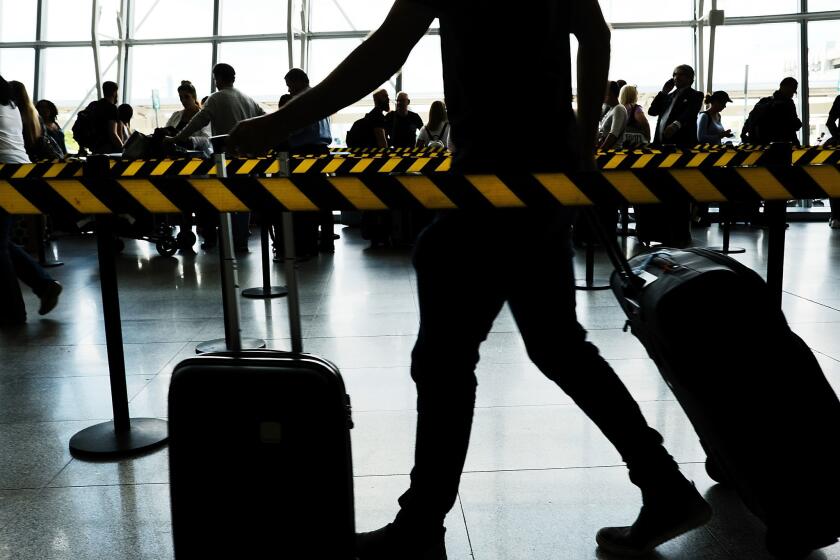These U.S. citizens won’t get coronavirus stimulus checks — because their spouses are immigrants

She works as a film producer and her small business has ground to a halt, forcing her and her husband to eat red beans and rice most nights, scramble to find small business loans and apply for medical assistance for their two children.
So the 44-year-old woman from the Midwest, who asked that her name not be used to protect her privacy, has had to bite her tongue as friends have celebrated the arrival of economic stimulus checks.
For the record:
7:59 p.m. April 21, 2020This story reported that more than 1 million U.S. citizens have been blocked from receiving federal stimulus checks because they are married to immigrants who don’t have Social Security numbers. In fact, of the 1.2 million Americans married to immigrants, only those who file joint tax returns and are not in the military are ineligible for stimulus checks.
As a U.S. citizen whose children are also U.S. citizens, she is excluded from the government’s $2-trillion coronavirus financial relief package because she files her taxes jointly with her husband, a Mexican citizen from Guadalajara.
“It’s the biggest slap in face that the government left us out,” she said. “It’s already such a stressful time. This just increases the stigma and feeling of shame. It feels like a very big betrayal.”
More than 1 million U.S. citizens, in states as far afield as California and Pennsylvania, have been blocked from receiving stimulus checks because they are married to immigrants who don’t have Social Security numbers.
Some are frontline workers employed in hospitals, police departments and public transit. Others have been laid off or are working fewer hours as a result of the COVID-19 pandemic.
The government’s CARES Act offers $1,200 to Americans earning up to $75,000 in adjusted gross income and who have a Social Security number and $500 for each child. But it excludes millions of tax-paying immigrants who do not have legal status — and it also blocks U.S. citizens if they file a joint tax return with a spouse who does not have a Social Security number.
“It’s just fundamentally unfair, and it’s really, really targeted to hurt,” said Randall Emery, president of American Families United, a nonprofit that advocates for U.S. citizens married to immigrants.
The order restricts some new entrants but does not include a broad restriction on new green cards as Trump had indicated a day earlier.
“It’s such a basic thing that the government would protect its own citizens and the government is really abandoning U.S. citizens when they need help the most,” he added. “A lot of people really need this just to survive.”
The exclusion affects millions of U.S. citizens, including children. About 1.2 million immigrants who lack legal status are married to a U.S. citizen, according to the Migration Policy Institute.
According to the law, any family that files taxes with an Individual Taxpayer Identification Number, which the Internal Revenue Service issues to workers who lack Social Security numbers, cannot receive an Economic Impact Payment — unless one spouse is a member of the U.S. Armed Forces.
“It’s a deliberately cruel carve-out,” said Manar Waheed, senior legislative and advocacy counsel with the American Civil Liberties Union. “In creating an exception for military families, they very, very deliberately left all of these other people out of the cash rebate.”
In Baltimore, Ashlee Ramirez, a registered nurse in an emergency room, has spent the last month helping to intubate COVID-19 patients. With her hospital short on protective gear, she has spent her own money on materials to make masks and face shields as well as on heavy duty garbage bags in case gowns run out. But she has yet to receive any economic stimulus money, even though her husband, Fredy, a Honduran citizen, received a Social Security number in January.
“What does it mean when I pledge allegiance to the flag?” she said. “It’s supposed to be justice for all. I feel like that flag that I love so much has not stood for justice for me and my family.”
In California, David Hessell-Cercado, 51, a fourth-grade teacher for the L.A. Unified School District who lives in Silver Lake, was startled to discover he would not receive a stimulus check.
After a friend got money, he checked his bank account several times. Nothing.
He had assumed his husband of six years, a Mexican citizen who is in the middle of applying for his green card, would not get a check as he didn’t have a Social Security number. But he never imagined the government would withhold assistance from a U.S. citizen.
While Hessell-Cercado still has a job, he said he felt bad for nurses and grocery store workers who were excluded even as they risked their lives each day.
“Really? We’re here all in this together, but some of us aren’t apparently,” he said.
The Midwestern film producer lived a pretty comfortable upper-middle class life until last month. She and her husband made just under $150,000 last year, own their home outright and have little debt. But her 2020 work was not slated to start until March 15 and was canceled just before that date as a result of the pandemic. So far this year, her business has netted $800.
She and her husband have cut back. For breakfast and lunch, they have relied on the city to provide free breakfasts and lunch boxes for the children. They are also researching medical assistance for her children, including occupational therapy and speech therapy for their son who has Mannose-binding lectin deficiency, a condition that affects the immune system and makes him particularly vulnerable to COVID-19.
“We’re clearly not taken care of given how much we pay in taxes,” she said, noting that they paid $30,000 in taxes last year. “It’s very, very scary. We are the people that live in the shadows. We can’t advocate for our family.”
For some American citizens long married to immigrants, the exclusion did not come as a surprise.
In 2008, many were penalized when Congress passed an economic-stimulus package that gave tax rebate checks to most taxpayers but excluded citizens whose foreign spouses lacked a Social Security number.
“It’s almost spiteful,” said Ally, a 48-year old former educator in Philadelphia who is married to a Brazilian citizen and has three children. She did not want her last name to be used for privacy reasons.
“It’s like, ‘Geez, my country still does not care about my family!’” she said. “I’m still a U.S. citizen. I should not be punished because of who I chose to marry.”
When she married her husband 16 years ago, she never imagined their daughter would graduate from college before Congress fixed the immigration system.
“It’s insane,” she said. “We went from being a young married couple to being almost grandparents and this situation has not been resolved.”
Earlier this month, Democratic Congressman Lou Correa (D-Santa Ana) introduced the Leave No Taxpayer Behind Act, an attempt to amend the CARES Act to ensure that all taxpayers, including immigrants, are eligible for their $1,200 relief check.
While the bill has little chance of gaining bipartisan support in the Senate, there may be some relief for immigrants in some states.
Last week, California Gov. Gavin Newsom announced a $125-million relief package to help immigrants without legal status by offering $500 cash grants for individuals in the U.S. illegally and up to $1,000 for families.
Working in the film industry in the Midwest, the producer worried that, even if the economy opens up in June or July, it may take another year or more to figure out how to provide shoots and castings that keep actors and directors safe.
“I don’t know if it’ll ever be business as usual for me again,” she said. “It’s very traumatic for every American and then you get our immigration issues have always been lurking in the background like an abscess on your back. Just this thing that never just goes away — and now it’s just proving to be yet another challenge.”
More to Read
Sign up for Essential California
The most important California stories and recommendations in your inbox every morning.
You may occasionally receive promotional content from the Los Angeles Times.













